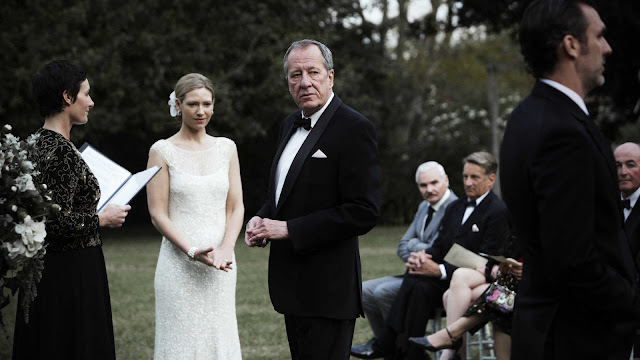The Daughter: Film Review
Cast: Sam Neill, Geoffrey Rush, Miranda Otto, Anna Torv, Paul Schneider, Odessa Young
Director: Simon Stone
It’s appropriate the opening and one of the closing shots of The Daughter is that of the mist hanging around mountains, mingling among the tops of the peaks and sinking in low to the ground.
It’s hard not to dismiss the imagery as being some kind of augur of what lies ahead for this tangled family drama about small towns, secrets and family.
In fact, as Sam Neill’s rugged and ruffled character intones, “It’s not a new story”.
And to be honest, he’s not far off the mark.
But what marks out Simon Stone’s Aussie dramaThe Daughter is the journey, because the destination’s visible to anyone who has a smattering of ability to pick up the signs foreshadowed early on.
Loosely based on Henrik Ibsen’s The Wild Duck, it’s the story of Paul Schneider’s Christian (an irony of name given his less than charitable behaviour) who heads home to the wedding of his father (a sturdily dependable and haunted Geoffrey Rush) and his housekeeper Anna (Fringe’s Anna Torv).
Reconnecting with an old friend Oliver, Christian’s tendency toward self-destruction and desire for redemption is threatened by a secret from the past.
In the meantime, the community where Rush’s Henry has closed the sawmill is reeling, and hurting with an uncertain future ahead, leading to volatile times and fractures that may never heal…
With a great ensemble cast, including our very own Sam Neill, The Daughter is a lyrical drama that treads familiar paths but does so with tremendous ease and vision.
Visually, The Daughter’s strength lies in its imagery, which is haunting with long lingering shots building the atmosphere and heightening the sense of mood and evocation (all thanks to the photography of Andrew Commis).
Initially, the film’s more about what’s hinted at and what’s unsaid, but the audience doesn’t have long to wait to pull the pieces together, which is perhaps one of the film’s failings, albeit acknowledged within by Neill’s meta-line. Though admittedly in the final third, the emotional pull is never quite as strong as it could be, perhaps given the predictability of the story.
Thankfully though, it’s in the performances.
Notably that of Odessa Young’s vulnerable teen Hedvig.
Without going into spoilers, Young’s need to channel some of the deeper emotions needed is evident and easily met (even if the story opts for convenient narrative contrivances in its final act).
All in all, The Daughter may put the familial into familiar, but it’s a relatively classily executed affair that benefits slightly more from its visuals than the emotional edges the story purports to aim for.





%20&%20Edith%20Poor%20(Lizzie%20Moyle)_%C2%A9BBCS%20&%20Bunya%20Entertainment.jpg)
No comments:
Post a Comment